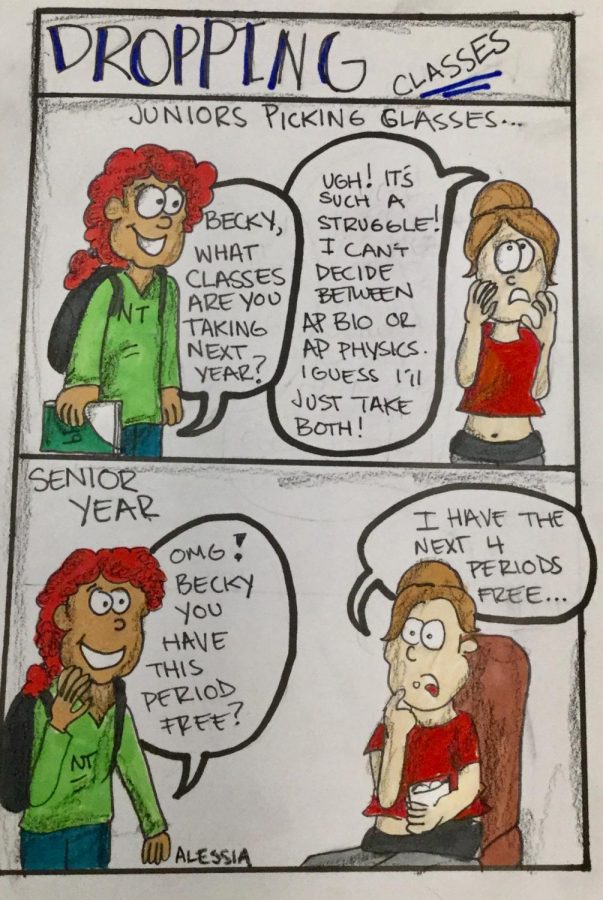Why seniors drop classes and activities 2nd semester
Students stray from usual routines in last months before college
The words “second semester senior” mean excitement for many seniors. There’s less pressure to keep grades high and students can take a second to pursue passions they might not have had time to do first semester. But another popular option is for students to drop a class or extracurricular.
Senior Suzi Callis explained that she dropped Symphony Orchestra because she had to stay up late doing homework every night and didn’t get much sleep.
But quitting orchestra at school doesn’t necessarily mean dropping music altogether, as Callis continues to take private lessons for violin outside of school.
Another area that seniors may decide to cut back on is sports. “I was hesitant to sign up for track because most of my friends were quitting, but I went to two practices to give it a chance,” said senior Chloe Solon, a cross country and track runner since freshman year.
“The team atmosphere was different since so many people had quit, and I didn’t like running in the cold because I wasn’t as motivated to work hard and get faster. I wasn’t gaining anything from it since I wasn’t motivated to try my best, and I wasn’t excited to go to practice, so I decided to quit,” she elaborated.
Solon said that she’s been able to find other ways to work out during the winter months and is much happier with the time she now has to spend with her friends before leaving for college.
For other students, the motivation to drop courses was more based on receiving college credit for taking AP classes.
“I found out that the colleges I wanted to go to didn’t take AP credits from college, so I figured there was no point to be stressed out all the time if in the end it doesn’t matter,” said senior Grace Hackett who dropped AP Chemistry.
Many students agreed that getting into and committing to a college has a strong impact on motivation. The general thought process is that once a student is accepted into college, grades no longer matter.
“Once people get into and have committed to a college they kind of stop trying in school. School is no longer about trying to get an A, it’s about trying to pass,” said Hackett.
Whether students see this as an opportunity to experiment with learning strategies that fit their needs best or spend their time on other activities other than school, the pressure is certainly lower.
While colleges aren’t going to rescind a student for simply dropping out of an activity, Solon pointed out that “When you are still applying to colleges, you are being evaluated for your actions and run the risk of being rejected.”
Students have found that the effects of dropping an activity or class can have are often positive and beneficial for their overall well-being.
“I now have fifth, sixth, and seventh free since I dropped orchestra, and I have gotten all my homework done at school since dropping orchestra which has increased the amount of sleep I get and reduced my stress significantly,” said Callis.
Sometimes it seems like there’s a certain stigma surrounding dropping an activity and students may worry that their peers will think that they’re slacking off.
I’ve heard people say it’s irresponsible to drop extracurriculars or sports just because colleges won’t know, and also that it shows you aren’t dedicated or never really liked it in the first place. I don’t think this is necessarily true, because although I enjoyed track other years, it was completely different this year and was missing the aspects that had previously made me enjoy the sport,” stated Solon.
Hackett agreed, saying that “Some people are embarrassed because they feel like everyone is judging them for dropping, but that just isn’t the case. No one cares.”
Extracurriculars and certain challenging classes give students the opportunity to grow mentally or physically, but at the same time, decreasing the time spent on those activities can give students exposure to new experiences.
“For the three years that I did it, track was a lot of fun, and it allowed me to spend time with great people and enjoy a team environment. But it felt like a totally different team this year since I was in a different group with a different coach and teammates who I didn’t really know. I also wanted to try new things for my last few months living here, and a substantial after-school commitment like track prevented me from doing that,” said Solon.






































